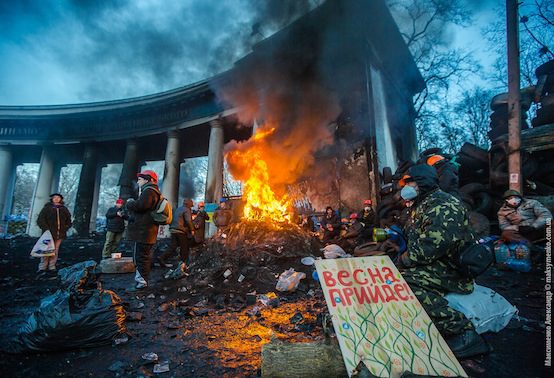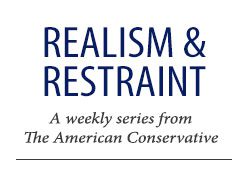U.S. Aid Makes Corrupt Countries More Corrupt
Our 'democracy building' assistance to certain countries--including Ukraine--has produced kleptocracies, or worse.

Barricade with the protesters at Hrushevskogo street on January 26, 2014 in Kiev, Ukraine.Sasha Maksymenko / cc
Counting on foreign aid to reduce corruption is like expecting whiskey to cure alcoholism. After closed House of Representatives impeachment hearings heard testimony on President Trump’s role in delaying U.S. aid to Ukraine, Senate Minority Leader Chuck Schumer declared: “Numbers don’t lie. It’s even more clear now that President Trump is not the anti-corruption crusader he claims to be.”
Most of the press coverage has tacitly assumed that American assistance is vital to fighting corruption in Ukraine. But that ignores foreign aid’s toxic record and Ukraine’s post-Soviet history.
A 2002 American Economic Review analysis concluded that “increases in [foreign] aid are associated with contemporaneous increases in corruption,” and that “corruption is positively correlated with aid received from the United States.”

Most of the press coverage has tacitly assumed that American assistance is vital to fighting corruption in Ukraine. But that ignores foreign aid’s toxic record and Ukraine’s post-Soviet history.
A 2002 American Economic Review analysis concluded that “increases in [foreign] aid are associated with contemporaneous increases in corruption,” and that “corruption is positively correlated with aid received from the United States.”
That was the year President George W. Bush launched a new foreign aid program, the Millennium Challenge Account (MCA). Bush declared, “I think it makes no sense to give aid, money, to countries that are corrupt.” But the Bush administration continued delivering billions of dollars in handouts to many of the world’s most corrupt regimes. By 2004, the State Department had codified what amounted to backtracking: “The MCA is an incentive-based supplement to other U.S. aid programs.” The Bush team found excuses to give MCA aid to some of the world’s most corrupt governments as well, including Georgia.
In 2010, President Barack Obama proclaimed at the United Nations that America was “leading a global effort to combat corruption.” Obama’s “aides said the United States in the past has often seemed to just throw money at problems,” the Los Angeles Times reported. But the reform charade was exposed the following year when the Obama administration fiercely resisted congressional efforts to curb wasteful aid. Secretary of State Hillary Clinton warned that restricting handouts to nations that fail anti-corruption tests “has the potential to affect a staggering number of needy aid recipients.”
In 2010, President Barack Obama proclaimed at the United Nations that America was “leading a global effort to combat corruption.” Obama’s “aides said the United States in the past has often seemed to just throw money at problems,” the Los Angeles Times reported. But the reform charade was exposed the following year when the Obama administration fiercely resisted congressional efforts to curb wasteful aid. Secretary of State Hillary Clinton warned that restricting handouts to nations that fail anti-corruption tests “has the potential to affect a staggering number of needy aid recipients.”
The Obama administration continued pouring tens of billions of American tax dollars into sinkholes such as Afghanistan, which even its president, Ashraf Ghani, admitted in 2016 was “one of the most corrupt countries on earth.” And the deluge of aid the Afghan government received only worsened the corruption. As John Sopko, the heroic Special Inspector General for Afghan Reconstruction (SIGAR), observed, “We need to understand how US policies and practices unintentionally aided and abetted corruption. We must recognize the danger of dealing with characters or networks of unsavory repute, tolerating contracting abuses, accepting shoddy performance and delivering unsustainable projects.”
The closed House impeachment hearings last week heard from acting U.S. ambassador to the Ukraine William B. Taylor Jr., who testified that he “had authority over the bulk of the U.S. effort to support Ukraine against the Russian invasion and to help it defeat corruption.” The Washington Post lauded Taylor as someone who “spent much of the 1990s telling Ukrainian politicians that nothing was more critical to their long-term prosperity than rooting out corruption and bolstering the rule of law, in his role as the head of U.S. development assistance for post-Soviet countries.”
Transparency International, which publishes an annual Corruption Perceptions Index, shows that corruption surged in Ukraine during the late 1990s and remains at obscene levels (though recent years have shown slight improvements). Taylor was ambassador to Ukraine from 2006 to 2009, when corruption sharply worsened despite hundreds of millions of dollars in U.S. aid. Ukraine is now ranked as the 120th least corrupt nation in the world—lower than Egypt and Pakistan, two other major U.S. aid recipients. What Washington Redskins owner Dan Snyder is to the NFL, Taylor appears to be to the anti-corruption cause.
Transparency International, which publishes an annual Corruption Perceptions Index, shows that corruption surged in Ukraine during the late 1990s and remains at obscene levels (though recent years have shown slight improvements). Taylor was ambassador to Ukraine from 2006 to 2009, when corruption sharply worsened despite hundreds of millions of dollars in U.S. aid. Ukraine is now ranked as the 120th least corrupt nation in the world—lower than Egypt and Pakistan, two other major U.S. aid recipients. What Washington Redskins owner Dan Snyder is to the NFL, Taylor appears to be to the anti-corruption cause.
Bribing foreign politicians to encourage honest government makes as much sense as distributing free condoms to encourage abstinence. Rather than encouraging good governance practices, foreign aid is more likely to produce kleptocracies, or governments of thieves. As a Brookings Institution analysis observed, “The history of U.S. assistance is littered with tales of corrupt foreign officials using aid to line their own pockets, support military buildups, and pursue vanity projects.” And both American politicians and bureaucrats are want to continue the aid gravy train, regardless of how foreign regimes waste the money or use it to repress their own citizens.
If U.S. aid was effective, Ukraine would have become a rule of law paradise long ago. The country’s new president, Volodymyr Zelensky, may be sincere in his efforts to root out corruption. But it is an insult to both him and his nation to pretend that Ukraine cannot clean up its act without help from Donald Trump. The surest way to reduce foreign corruption is to end foreign aid.
If U.S. aid was effective, Ukraine would have become a rule of law paradise long ago. The country’s new president, Volodymyr Zelensky, may be sincere in his efforts to root out corruption. But it is an insult to both him and his nation to pretend that Ukraine cannot clean up its act without help from Donald Trump. The surest way to reduce foreign corruption is to end foreign aid.
James Bovard is the author of Lost Rights, Attention Deficit Democracy, and Public Policy Hooligan. He is also a USA Today columnist. Follow him on Twitter @JimBovard.

0 Comments:
Post a Comment
Subscribe to Post Comments [Atom]
<< Home